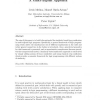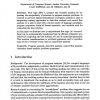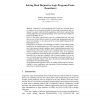80 search results - page 6 / 16 » A Procedural Semantics for Multi-adjoint Logic Programming |
EUSFLAT
2001
13 years 8 months ago
2001
The aim of this paper is to build a formal model for similarity-based fuzzy unification in multi-adjoint logic programs. Specifically, a general framework of logic programming whi...
LPKR
1997
Springer
13 years 11 months ago
1997
Springer
In this overview we show how Knowledge Representation (KR) can be done with the help of generalized logic programs. We start by introducing the core of PROLOG, which is based on de...
CC
1998
Springer
13 years 11 months ago
1998
Springer
Abstract. Flow logic offers a compact and versatile notation for expressing the acceptability of solutions to program analysis problems. In contrast to previous logical formulation...
AGP
2003
IEEE
14 years 20 days ago
2003
IEEE
Disjunctive Logic Programming (DLP) under the consistent answer set semantics is an advanced formalism for knowledge representation and reasoning. It is, under widely believed assu...
ICLP
2009
Springer
14 years 8 months ago
2009
Springer
We extend to disjunctive logic programs our previous work on computing loop formulas of loops with at most one external support. We show that for these logic programs, loop formula...



